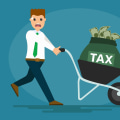Gallup, on the other hand, asks Americans if they consider the taxes they have to pay to be fair. Currently, 55% say it's fair, while 43% disagree. The percentage that describes their taxes as not fair has consistently been lower than the percentage that says they pay too much in taxes, meaning that some taxpayers' criticisms of their taxes are more nuanced than others. That pattern also exists this year, with 50% saying their taxes are too high, but 43% smaller consider them unfair.
Americans' views on tax fairness have tended to vary depending on the incumbent president's party, with an average of at least several points higher when Republicans are in office (including 60% during George W. The Bush presidency and 60% under Trump) than when the Democrats were in power (including 48% in 1997 and 1999 with Bill Clinton and 56% under Barack Obama). Both Bush and Trump cut taxes while in office. However, Americans' satisfaction with their taxes increased during both presidents even before those measures were taken.
Obama did not raise income taxes on Americans until his second term, when some temporary income tax cuts approved by Bush did not extend to high-income Americans, and new taxes passed as part of the Affordable Care Act came into effect. At the same time, there is little difference in the perception of equity based on household income, since just over half of the major income groups consider that what they pay in taxes is fair, a pattern seen in most of the Gallup trend since at least the early 2000s. When it comes to fiscal equity, Democrats' opinions have moved more in the past decade than as to whether their taxes are too high. Even so, Republicans' opinions have been much more variable, with significant changes linked to changes in presidential administrations, even this year, before Biden implemented any tax changes.
When asked what will happen to their taxes in the next 12 months, 57% of Americans predict that they will rise more than they are now. Most of the rest, 33%, think they won't change, while 8% expect them to fall. As a new Democratic presidential administration takes over the reins in Washington, DC, C. See the full answers to questions and trends (PDF download).
Learn more about how the Gallup Poll social series works. Each sample of domestic adults includes a minimum share of 70% of respondents with mobile phones and 30% of those surveyed with landlines, with additional minimum quotas per time zone within the region. Landline and mobile phone numbers are selected using random digit dialing methods. Search, Examine, Compare and Export Nearly a Century of Primary Data.
Get our most relevant information on the opinions of the world's more than 7 billion people. Fields marked with an asterisk (*) are mandatory and Americans are unlikely to react strongly to Joe Biden's defense budget and his decision to withdraw troops from Afghanistan. Mentions of COVID-19 as the most important problem in the U.S. UU.
They have fallen to their lowest point since the start of the pandemic. The percentages that mention immigration and race relations have increased since last month. Americans are very satisfied with the launch of the coronavirus vaccine and are less concerned about the availability of vaccines than about the decline in public demand. Taxes exceeded 40 percent of GDP in seven European countries, including France, where taxes accounted for 46 percent of GDP.
The foundation adds corporate taxes to household tax burdens, but does not add corporate profits to household income. With the arrival of tax day, three out of four Americans expect to file their income taxes on time this year, and most of those who do so expect a refund from the federal government. Adding Social Security and Medicare taxes to the Treasury's income tax estimates increases the estimated tax burden, but it doesn't change the conclusion that taxes are low compared to previous years. The misleading estimate comes from a study by the Tax Foundation, a Washington organization that tracks tax policy.
Value added tax (VAT), a type of general consumption tax that is collected in stages, is the main source of consumption tax revenue within the OECD. . .







Leave Reply